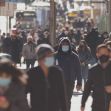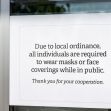To combat the COVID-19 pandemic raging across the country, 34 states now require face masks in public. These mandates join social distancing measures such as mandatory business closures and limitations on the number of people allowed to congregate in an area.
Public response to these health regulations has been mixed. While many are supportive, others argue that the government, or in some cases, private companies, are impinging on their civil rights. The battle is being fought in court. A flurry of lawsuits challenging various COVID-19 regulations has already been brought forth.
The legitimacy of the new laws is also being challenged in criminal court. Hundreds of people have been arrested for COVID-19-related crimes. In Hawaii alone, nearly 200 people have been arrested for flouting the state's 14-day mandatory quarantine since March 2020. In Florida, two residents were jailed for refusing to comply with quarantine orders. The pair previously tested positive for COVID-19.
It's not just people defying social distancing regulations who risk jail time. Police have also arrested men and women who refused to wear masks in public, or, in the case of New York City mom Kaleemah Rozier, who refused to wear the mask properly. Rozier has secured an attorney and plans to file a $10 million wrongful arrest suit.
The pushback against COVID-19-related health regulations revolves around claims that the orders are unconstitutional. What right, if any, does a state or local government have to impose face mask mandates and social distancing measures during a public health crisis? Mandatory mask orders, in particular, have triggered a strong reaction. A new class of internet video starring "anti-maskers" has emerged.
Their objections generally fall into two categories: mandatory masks and similar measures violate your First Amendment right to free speech, assembly, and association, or they violate your right to control your own body.
These claims have so far been unsuccessful in court. In May, a federal judge in Maryland upheld Gov. Larry Hogan's quarantine orders, rejecting the plaintiffs' claim that their civil rights were violated by the Governor's decision to limit gatherings to less than ten people. Specifically, the plaintiffs argued that their right to assemble was impeded.
"The world is now in the grip of a public health crisis more severe than any seen for a
hundred years," U.S. District Judge Catherine C. Blake wrote.
"In the face of this pandemic, Gov. Larry Hogan, using the emergency powers granted him by the state legislature, has issued a series of executive orders designed to slow the spread of the
disease and protect the health of Maryland residents… Because of the ease with which COVID-19 spreads and because asymptomatic individuals may spread the virus, a gathering larger than ten people poses an increased risk that more people will get the virus if one of the attendees has it."
Blake referred to the government's police power, its authority to protect the health and welfare of its citizens. Historically, this ability has granted the government broad powers.
Objections centering on freedom of expression are also being challenged. Mask mandates, it is argued, do not inhibit expression. Instead, to the extent they restrict free expression, the mandates limit how and where you express yourself. These restrictions, known as "time, place, and manner" restrictions, do not violate the First Amendment.
America has dealt with health crises before. In 1905, the U.S. Supreme Court determined in Jacobson v. Massachusetts that the government could legally mandate vaccinations in the midst of a smallpox epidemic, writing that it "has distinctly recognized the authority of a state to enact quarantine laws and 'health laws of every description'... Upon the principle of self-defense, of paramount necessity, a community has the right to protect itself against an epidemic of disease which threatens the safety of its members."
Chief Justice John Roberts cited Jacobson in the recent case of South Bay United Pentecostal Church v. Newsom, the first COVID-19 case that's reached the Supreme Court. In the 5-4 decision, the court defended California Gov. Gavin Newsom's statewide quarantine measures.
Current medical research shows that asymptomatic COVID-19 carriers can still transmit the deadly disease. This fact can be seen as justification for a broad swath of government regulations.






